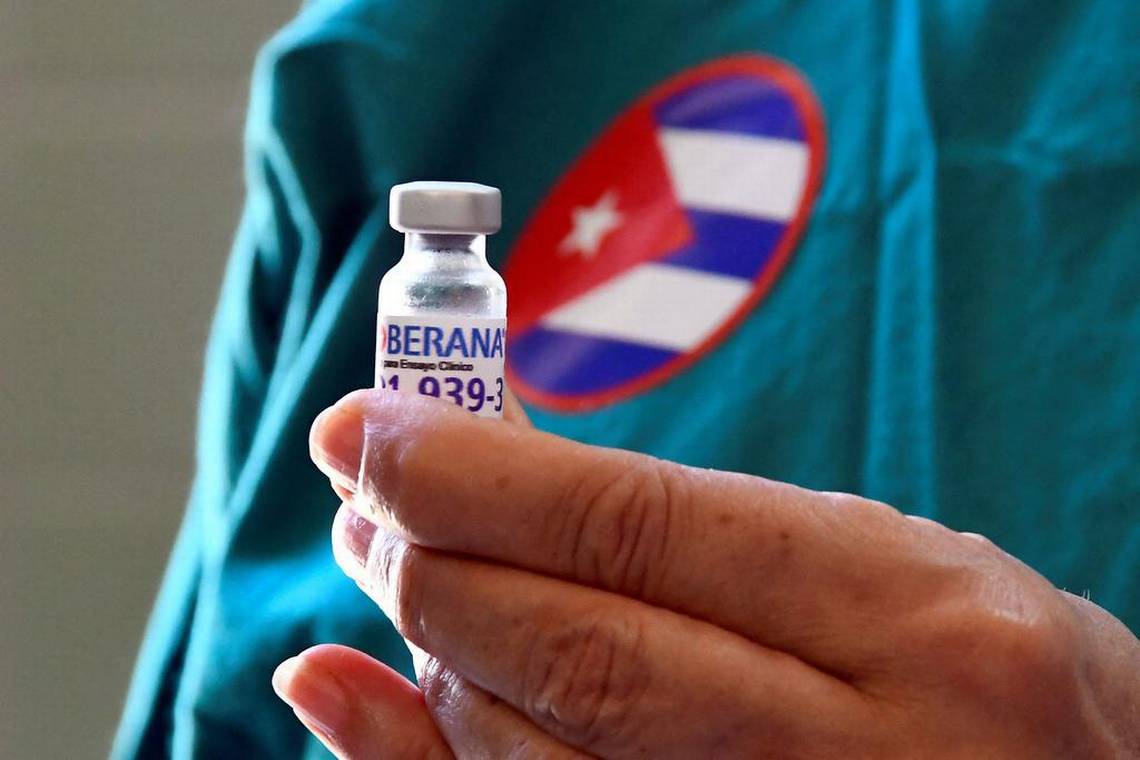Cuba’s Development Of Covid Vaccines Is ‘An Incredible Feat’ For Low Income Countries, Expert Says
Cuban officials say the vaccinations have a 90% protection rate against symptomatic COVID when three doses are provided.


Photo courtesy of the Miami Herald
Cuba has vaccinated most of its population against COVID-19 with homegrown vaccinations. As a result, the country’s track record is the highest of the world’s largest and wealthiest nations. Only the United Arab Emirates maintains more robust vaccination data.
According to CNBC, though the Caribbean island has struggled to keep local supermarket shelves full, reaching a vaccination milestone is a big step in the right direction.
“It is an incredible feat,” Helen Yaffe, a Cuba expert and lecturer in economic and social history at the University of Glasgow, Scotland, told CNBC via telephone.
“Those of us who have studied biotech aren’t surprised in that sense because it has not just come out of the blue. It is the product of a conscious government policy of state investment in the sector, in both public health and in medical science.”
According to statistics collected from Our World in Data, nearly 86% of the island’s population has been fully vaccinated against COVID with three doses, and 7% have been partially immunized against the disease.
The country’s health officials have administered 3.17 million booster shots to the entire population to monitor the spread of the Omicron Variant. Additionally, the communist island is the only Latin American country in the Caribbean to create homegrown vaccines for COVID.
“Just the sheer audacity of this tiny little country to produce its own vaccines and vaccinating 90% of its population is an extraordinary thing,” John Kirk, professor emeritus at the Latin America program of Dalhousie University in Nova Scotia, Canada, told CNBC via telephone.
Cuba’s reputable biotech region has developed five individual COVID vaccines, including Abdala, Soberana 02, and Soberana Plus. Cuban officials say the vaccinations have a 90% protection rate against symptomatic COVID when three doses are provided.
Cuba’s vaccines are relatively different than Pfizer and Moderna — two of the largest commercial pharmaceutical chains in the U.S. The messenger (mRNA) vaccines instruct the cells to formulate protein, creating an immune response in the body. In contrast, Cuba’s vaccines are subunit protein vaccines, similar to the Novavax vaccine. Low-income countries are likely to benefit from the vaccines because they’re cost-effective, manufactured at scale, and do not require deep freezing.
While international officials believe the shots would be essential for the “global south,” low vaccination rates persists in other countries across the globe. For example, CNBC reported
nearly 70% of the people in the European Union had been fully vaccinated, less than 10% of the African population had been fully vaccinated.Cuba’s vaccines would likely have to be approved by the WHO to make them available for use in other countries. However, their vetting process would involve evaluating the production facilities where the vaccines are produced, which Cuban health officials say is not a rapid process.
“I think it is clear that many countries and populations in the global south see the Cuban vaccine as their best hope for getting vaccinated by 2025,” said Yaffe, regarding the benefits low-income countries would obtain if the WHO approves Cuba’s vaccines.
“And actually, it affects all of us because what we are seeing with the omicron variant is that what happens when vast populations have almost no coverage is that you have mutations and new variants developing, and then they come back to haunt the advanced capitalist countries which have been hoarding vaccines,” she added.
Kirk said the WHO’s probable approval of Cuba’s nationally developed vaccines would bring “enormous significance” to developing countries.
“One thing that is important to bear in mind is that the vaccines don’t require the ultra-low temperatures which Pfizer and Moderna need, so there are places, in Africa in particular, where you don’t have the ability to store these global north vaccines,” Kirk said.
He also stated that Cuba’s primary goal isn’t to make sizable profits from the COVID vaccines, unlike other countries and pharmaceutical companies.
“The objective of Cuba is not to make a fast buck, unlike the multinational drug corporations, but rather to keep the planet healthy. So, yes, making an honest profit but not an exorbitant profit as some of the multinationals would make,” Kirk said.
The number of daily COVID cases has increased to 2,063 as of Jan. 11, causing a 10-fold increase since the end of December due to the Omicron Variant spreads.
While the number of variant-related cases continues to rise across countries in the American region, the Pan American Health Organization, the WHO’s regional Americas office, warned the surge in cases would likely lead to hospitalizations and deaths in the coming weeks, CNBC reported.
Cuba still has a mask mandate in place for the country’s residents and incoming tourists.